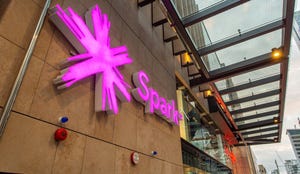Eurobites: EE extends 4G coverage through Shared Rural Network scheme
Also in today's EMEA regional roundup: Nokia supplies FWA kit to Ooredoo; Telekom Srbija bags EIB loan; world's first ever SMS could be yours…

Also in today's EMEA regional roundup: Nokia supplies FWA kit to Ooredoo; Telekom Srbija bags EIB loan; world's first ever SMS could be yours…
EE, the BT-owned mobile operator, is expanding its 4G coverage into more than 2,000 UK locations by June 2024 as part of the government-backed Shared Rural Network (SRN) initiative, which is intended to eliminate "partial not-spots" (places which receive coverage from at least one, but not all, of the UK's mobile network operators) out in the sticks. EE says it has upgraded its 4G network in more than 800 areas across the UK since the SRN deal was agreed between the four main operators in March 2020. Ultimately, the government hopes 4G coverage will be extended to 95% of the UK (in geographic terms) by the end of 2025 through the implementation of the SRN plan. (See SRN promises 4G coverage jump in rural UK.)
Nokia has been chosen by MENA operator Ooredoo to supply 5G fixed wireless access gear to its residential and business customers. Ooredoo plans to use the technology to create additional revenue streams in such areas as smart-home services and the Internet of Things. Nokia's FastMile 5G consumer premises equipment and WiFi Beacons will be at the heart of the deployment.
Closer to home, Nokia has been giving its AI-powered Scene Analytics technology an airing in the Belgian city of Genk to address the issue of vehicle-based noise pollution. The software combines IoT data from connected cameras and microphones to inform city authorities of excessive noise levels from Genk's Stalenstraat, not least from the modified exhaust systems beloved of boy racers. If an approaching vehicle exceeds the pre-determined threshold, the microphones and cameras begin recording. Nokia's box of tricks interprets the event-related data transmitted from the sensors using a decibel-powered algorithm for audio analysis and automated number plate recognition. This information is sent to authorities who decide what to do with it.
The European Investment Bank has agreed a €70 million ($78.8 million) loan to Telekom Srbija, which the Serbian operator will use to improve the capacity, coverage and quality of its 5G and 4G mobile services. The loan will, say the two parties, enable 60% of Serbians residents to gain access to 5G and extend 4G to "nearly everyone" in the country. Since 2020, the European Investment Bank has invested €195 million in three "digital transformation" projects in Serbia.
Swisscom has acquired the MTF Group's companies operating in the German-speaking part of Switzerland and in the principality of Liechenstein. The MTF Group is a provider of IT services for small and midsized businesses, a sector in which Swisscom hopes to increase its IT market share. The deal brings an additional 170 employees into the Swisscom fold.
Can anyone guess the content of the world's first ever SMS text message? No, it wasn't "U OK hun?". Nor was it "C U l8r". It was, in fact, boring old "Merry Christmas," and it was sent on the Vodafone network in December 1992. And now Vodafone is hoping to raise money for the UN Refugee Agency by auctioning a non-fungible token (ask your kids) of that historic communication. The auction is taking place on Tuesday, December 21, and if you're planning to put in a bid you'll need to find some Ether cryptocurrency. The successful bidder will, it says here, "claim exclusive ownership of a detailed and unique replica of the original communication protocol that transmitted the world's first SMS." How gr8 is that?
Meanwhile, from the "we're all off to hell in a handcart" department, research commissioned by UK fiber provider Hyperoptic has concluded that Brits plan to spend seven hours and 24 minutes online on Christmas Day. OK, most of that will be watching some form of telly that doesn't come through an aerial, but 19% of respondents will be logging on to share an image of their Christmas dinner. Don't come crying to us if your gravy goes cold.
— Paul Rainford, Assistant Editor, Europe, Light Reading
Read more about:
EuropeAbout the Author(s)
You May Also Like












